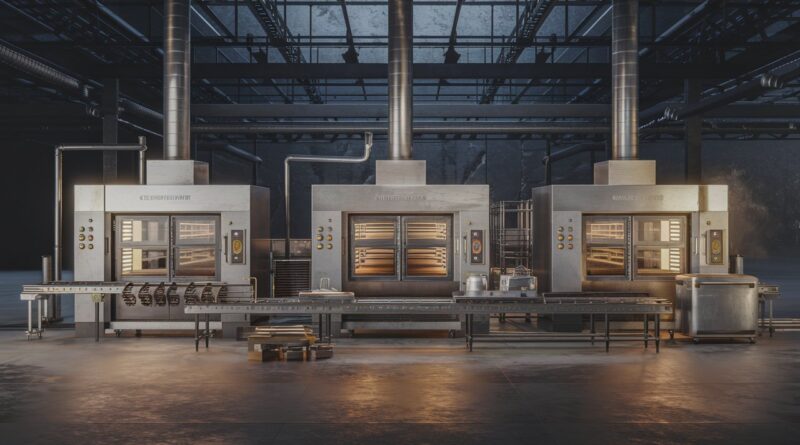How Are Batch or Conveyorized Powder Coating Ovens the Better Choice for Your Needs?
Choosing the right powder coating oven is essential for achieving top-quality finishes in manufacturing. Whether you are working with small batches of custom pieces or handling large-scale, repetitive jobs, the type of oven you use can make a big difference. Batch ovens and conveyorized ovens each offer unique advantages depending on your production needs. Understanding how these ovens work can help you make a better decision for your manufacturing process, especially when looking for efficiency, flexibility, and precision in powder coating applications.
Flexibility in Batch Ovens for Varied Production Schedules
Batch ovens are known for their flexibility, making them ideal for companies that deal with smaller, varied production runs. Unlike conveyorized ovens that work best for continuous, high-volume tasks, batch ovens can handle multiple jobs of different sizes and specifications. This is particularly helpful when production schedules fluctuate or when custom jobs need to be completed alongside regular production.
For example, a powder coating oven in a batch setup allows operators to easily adjust temperature, timing, and airflow to suit the needs of a specific project. This control ensures that even complex parts with unique coating requirements get the precise treatment they need without disrupting the workflow. The flexibility of batch ovens makes them a go-to option for industries that require versatility in production.
Conveyorized Ovens Offering Continuous Processing for High Volumes
When it comes to high-volume jobs, conveyorized powder coating ovens provide a continuous, automated process that keeps production moving smoothly. These ovens are designed to handle large quantities of parts with minimal manual intervention, making them perfect for industries that need consistent throughput without interruptions.
Conveyorized powder coating ovens use a belt or track system that moves parts through the oven in a steady, controlled manner. This automation ensures that every piece receives the same level of coating, which is crucial for maintaining product consistency. Manufacturers benefit from this setup by reducing the need for manual labor, which in turn reduces human error.
Precision Control in Batch Ovens for Complex, Custom Coatings
Batch ovens excel when precise control is needed, particularly for custom coating jobs that require unique specifications. Operators can fine-tune every aspect of the oven’s settings, ensuring that intricate parts with complex shapes and sizes are evenly coated. This level of control is especially important when dealing with powder coating ovens where exact temperature and airflow are necessary to achieve high-quality finishes.
In addition to offering precision, batch ovens allow for easy adjustments in between jobs. Whether it’s a different coating material, color, or thickness, batch ovens provide the flexibility needed to handle these variations without missing a beat. This makes them an excellent choice for industries where customization is key, such as automotive, aerospace, or specialized equipment manufacturing.
With a powder coating oven in a batch setup, manufacturers can meet customer demands for one-of-a-kind parts while maintaining the same high level of quality across every project.
Conveyorized Systems Reducing Downtime with Automated Flow
For manufacturers that prioritize minimizing downtime, conveyorized powder coating ovens are a smart investment. These systems are designed to keep production lines running continuously, with minimal need for manual intervention. The automated flow allows for seamless transitions between tasks, reducing the time spent on starting, stopping, and adjusting the system.
One major advantage of conveyorized systems is that they help reduce the amount of time workers spend managing the oven. Since parts are automatically fed into the oven and removed once the coating process is complete, operators can focus on other tasks, improving overall productivity.
By using an automated conveyor system, manufacturers can significantly reduce their production downtime and increase efficiency. This advantage is particularly beneficial in industries where high-volume, repetitive jobs are common, such as consumer goods or industrial parts manufacturing.
Batch Ovens Maximizing Space for Oversized Components
Space limitations can be a significant concern when working with large or unusually shaped components. Batch powder coating ovens provide a solution by offering flexible internal space that can accommodate oversized parts. This is especially useful in industries like heavy machinery, where custom parts often need to be powder-coated without fitting into standard conveyorized systems.
Batch ovens are often customizable in terms of size, allowing manufacturers to choose the dimensions that best suit their needs. This means that even the largest parts can be powder-coated efficiently, without needing to modify the process or resort to outsourcing. The ability to handle these oversized components gives batch ovens a clear edge for companies working on large-scale projects.
In addition, batch ovens’ ability to work with oversized components ensures that manufacturers can keep all aspects of production in-house, reducing lead times and avoiding the additional costs that come with third-party services.
Conveyorized Efficiency in Handling Repetitive, Large-Scale Jobs
For industries handling repetitive, large-scale jobs, conveyorized powder coating ovens provide unmatched efficiency. These ovens are designed to process the same parts continuously, ensuring that each component receives identical treatment in terms of coating application, curing time, and finish quality. This efficiency reduces the chance of variation in product quality, which is essential for maintaining customer satisfaction.
Conveyorized ovens excel in mass production environments where speed and consistency are critical. The automated nature of these systems reduces human error and allows for faster turnaround times, making them ideal for sectors like consumer goods or automotive manufacturing, where demand for consistent, high-volume production is high.

